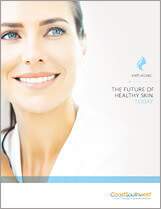As GCI put it in their coverage of how Allure had banned a certain term from ever being used again in the magazine’s pages, “Anti-aging Is So 2016.”
Allure‘s reasoning? The words “anti-aging” are “subtly reinforcing the message that aging is a condition we need to battle – think antianxiety (sic) meds, antivirus software, or antifungal spray.”

Yet as our own Traci Casell, Coast Southwest’s Market Development Manager, Anti-aging, observed, “I think Allure is dumbing down the term ‘anti-aging.’ They’re making it purely a social issue when there’s a lot more involved than syntax. Aging of the body and skin is a condition, and there are ways to combat it and help us feel better about ourselves as we age.
“We exercise and eat well to maintain our health and slow down aging effects,” she points out. “We use skin care products for the face and body to maintain healthy skin and help prevent the aging effects on our skin caused by the sun, pollution, and the environment. It’s about the pursuit of prevention and well-being, not just vanity, and anti-aging products and regimens are a part of that,” riding a trend toward “serene beauty” that’s taken hold among both older and younger women.
As she underlines, the worldwide skin care products industry is forecast to reach $216.52 billion by 2021, with enormous growth ahead in anti-aging, body lotions, sun protection, and multi-functional skin creams.
“So is Allure shaming those who want to age gracefully, meaning those who want to slow down the aging effects on their bodies?” Traci says. “Beauty is no longer driven specifically by a desire to look younger, which is what they’re claiming the term ‘anti-aging’ to mean. The goal is to look beautiful and healthy at whatever age. It’s about prevention rather than trying to turn back the clock.”
A call to arms or a grab for eyeballs?
If “anti-aging” is now taboo under Allure’s version of Newspeak, what euphemism will be permissible when referring to these types of products? It reminds us of the criticisms leveled against politicians and bureaucrats who have banned the use of the term “climate change” within government agencies: simply not using a label doesn’t make a thing is non-existent.

Hundreds of millions of consumers around the world understand and accept the concept of ‘anti-aging’ because it’s exactly what they’re trying to accomplish. Telling them they should renounce it is like trying to legislate gravity: the rest of the universe is going to pretty much ignore you.
To back their play, Allure stacks the deck by using the lustrous Helen Mirren as their cover model. Never mind the fact that Dame Helen is an unapologetic user of consumer skin care products, she gladly admits. “A brand like L’Oréal has amazing technology.”
There are at least a few other things to consider when it comes to Allure‘s position:
- It comes off as elitist: Not the kind that politicians trumpet about, necessarily, but anyone who’s had experience with the world of fashion, beauty and lifestyle publishing knows aloofness and pretension are par for the course, as self-proclaimed tastemakers decide what’s acceptable, fashionable or worthy of our attention.
- It’s intentionally provocative: Like much of what happens in the media, the motives underlying the message can be as gray as Brooklyn slush. Taking this stand is, not uncoincidentally, a pretty good ploy for grabbing eyeballs, not just for promoting positivism or empowerment. Allure has been playing catch-up when it comes to social media; as of 2015, its website, according to its own media kit, had 2.9 million monthly unique visitors, yet its social accounts had only 217,000 or so followers. Its new editor-in-chief hails from a background at Nylon where she built powerful web and social presences, and capturing hits and followers is crucial to Allure’s future viability.
- It seems to exploit ageism: Allure touches on the very real concern about how women are judged by their appearance as they get older, but a magazine whose signature promotion is its “Best of Beauty” awards and whose very name signifies
it’s focused on how attractive we are to others may only leverage it long enough to make some noise and move on. It’s easier to split semantic hairs and keep selling ad pages. Will the cover girl for October be in the same age bracket as Ms. Mirren? If she is, then we should give Allure credit for sticking to their guns. Let’s hope it’s not just a stunt to attract attention. Other pubs that have adopted strong POVs on issues have only been able to stand firm until the moment a major advertiser calls up to say, “We’ve got a bit of a problem with this editorial position of yours…”
Anti-aging isn’t about holding on, but moving ahead with grace
So bravo, Allure, for taking a stand. We look forward to seeing how far you’ll take this, but right now you deserve credit for making an important point about how America’s cultural attitudes toward aging create unfair pressures on women. As you put it, “Let’s agree that appreciating the dewy rosiness of youth doesn’t mean we become suddenly hideous as years go by.”
That’s part of a conversation we all need to have. Yet taking a stand against ageism doesn’t automatically require we reject fighting the negative effects of the passing years. The two aren’t mutually exclusive.
As Traci pointed out, ‘anti-aging’ is about much more than vanity. There’s a complex balance between our desire to look good, which isn’t an unhealthy thing if it helps us with our confidence or maintains a positive self-image, and the very real need to take care of ourselves physically, even as we embrace the realities and benefits of getting older.
Plus, as the noted philosopher John C. Mellencamp once observed, a big reason many of us will always fight aging rather than welcome it is that we don’t like where it leads us in the end.




